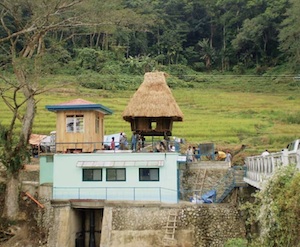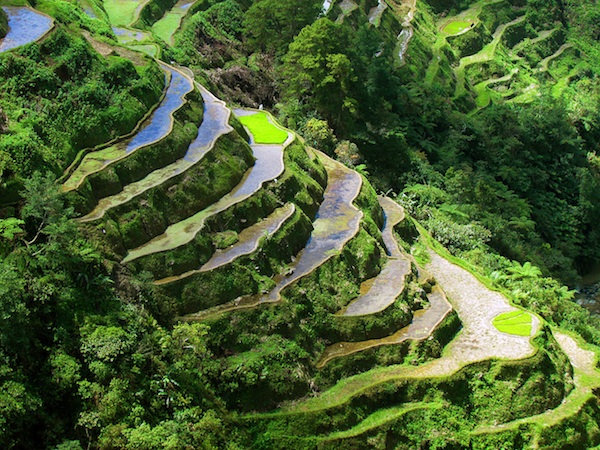Global Sustainable Electricity Partnership Project
 In 1995, the Ifugao Rice Terraces of the Philippine Cordilleras were inscribed in the World Heritage List. For 2,000 years, the high rice fields of the Ifugao have followed the contours of the mountains. The fruit of knowledge handed down from one generation to the next, and the expression of sacred traditions and a delicate social balance, they have helped to create a landscape of great beauty that expresses the harmony between humankind and the environment.
In 1995, the Ifugao Rice Terraces of the Philippine Cordilleras were inscribed in the World Heritage List. For 2,000 years, the high rice fields of the Ifugao have followed the contours of the mountains. The fruit of knowledge handed down from one generation to the next, and the expression of sacred traditions and a delicate social balance, they have helped to create a landscape of great beauty that expresses the harmony between humankind and the environment.
Deforestation, modernisation and climate change, however, threaten to destroy the rice terraces. Hence, in 2001, confronted with the deterioration of the rice terraces and citing deficiencies in conservation planning for the rice terraces, UNESCO placed them on the list of World Heritage in Danger.
Clean, Renewable Hydropower Protects “Stairways to Heaven”.
In keeping with its mission to address electricity issues and promote sustainable development, the Global Sustainable Electricity Partnership proposed to the Philippine authorities the development of a 200 kW run-of-river hydropower project that would generate sustainable revenues allocated to the conservation of the rice terraces. The Republic of the Philippines is blessed with abundant hydropower resources that can help address climate change, while providing a model of local sustainable energy-based development, regional vitalization and heritage conservation.
After several years of pre-feasibility, feasibility and environmental studies, including extensive public consultations, and a 10-month construction period, the mini-hydropower plant on the Ambangal river was inaugurated on January 25, 2010. The entire project was focused on the dual objective of maintaining and improving the quality of life for local communities engaged in rice-terrace farming and rehabilitating the Ifugao Rice Terraces World Heritage Site.
Building a hydropower plant is a challenging task. In the case of the Ifugao Ambangal Mini-hydro Power Plant, the construction was even more demanding. Steep slopes, limited site accessibility and severe weather that could provoke landslides posed additional difficulties with regard to performing the work in a timely and safe manner. Under such astringent conditions, the use of heavy machinery was very impractical. In this respect the project represented an innovative challenge with regard to construction techniques and minimisation of the environmental impact.
The whole project was funded by the Global Sustainable Electricity Partnership, with the main contribution provided by TEPCO (Tokyo Electric Power Company). Other GSEP participating members were KANSAI Electric Power Company, Électricité de France, ENEL S.p.A., RWE AG and Hydro-Québec.
Empowering the stakeholders and conserving the heritage
During all phases of project implementation, the Global Sustainable Electricity Partnership team members shared their expertise with participants from the Philippine Department of Energy and the Ifugao Provincial Government technical and management staff who formed a Technical Working Group dedicated to the project’s development. Various activities were assigned to the group members, creating a participation process where each individual could contribute, share his/her experience, develop a methodology to integrate the different aspects of the project’s implementation for future replication, and develop the tools to manage the Rice Terraces Conservation Fund.
Central to this project was the establishment of the Rice Terrace Conservation Fund. All proceeds from the power generated by the Ifugao-Ambangal Mini-hydro Power Plant, except for those needed for the operation and maintenance of the plant, will go to terraces conservation purposes: maintenance and stabilisation of the rice terraces, and irrigation systems to reverse their deterioration. Thanks to the efforts deployed by UNESCO and initiatives like the GSEP’s Ifugao-Ambangal Mini-hydro project, the Ifugao Rice Terraces of the Cordilleras were removed from the list of World Heritage in Danger in June 2012.
Lessons learned and replicability
The project is a perfect example of true sustainable energy development, providing much needed clean, renewable electricity to the region, improving quality of life for people working in the rice terraces, and contributing to the conservation of a world-renowned cultural heritage. Local communities, who were involved at all stages of the project’s development, welcomed the new hydropower plant and benefit from it in several ways.
Sustainable energy projects such as the Ifugao-Ambangal Mini-hydro Project can protect our heritage while improving quality of life today. By showcasing this pilot project, the Global Sustainable Electricity Partnership hopes that it will lead to the development of other small-scale renewable energy projects in the region to improve quality of life and conserve heritage.

















